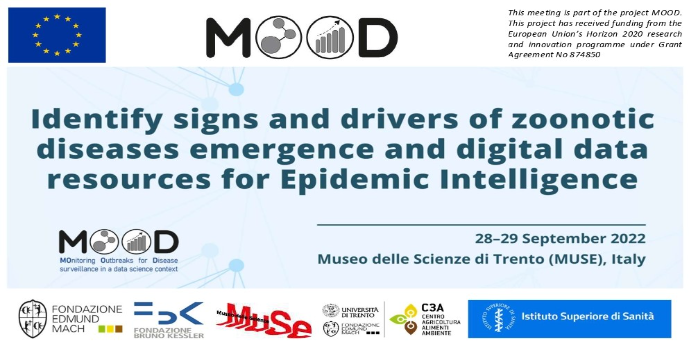MOOD partners are invited to join this 2-days hybrid workshop organized by Working Package 2 Fondazione Edmund Mach (Italy) on Wednesday 28th and Thursday 29th September 2022. This workshop will provide a forum for showcasing current research and findings in the field as well as for identifying critical questions and future research challenges including the provisioning of new tools and data for Epidemic Intelligence and highlighting the interdisciplinary approaches needed to meet them under the One Health umbrella.
The scientific program will be organized in 5 sessions with plenary lectures by international experts (keynote) followed by a presentation session (oral or posters) from MOOD partners and other invited experts. The workshop will conclude with a final round table discussion. Other side events will be organized to disseminate the key messages arising from this workshop.
The final programme is now public:
About
In the great acceleration era of the Anthropocene, the emergence of zoonotic pathogens including those with high pandemic potential is occurring at a faster rate than in any precedent historical phase. The scientific evidence demonstrates that emergence is preceded by a combination of driving factors and events which span from global environmental changes ( i.e. climate change, biodiversity loss, land use) to changes at the local scale in socio-economical conditions, food habits and cultural trends. Seven major anthropogenic drivers of zoonotic disease emergence have been identified by UNEP: the increasing demand for animal protein, unsustainable agricultural intensification, increased use and exploitation of wildlife, unsustainable utilization of natural resources accelerated by urbanization, land-use change and extractive industries, travel and transportation, changes in food supply chains and climate change.
Epidemic intelligence aims at the early identification of potential health threats to improve timely detection and awareness of infectious disease events at the earliest stage of their emergence. Therefore, the identification and surveillance of the drivers and conditions which are recognized to promote the emergence and spread of infectious diseases are crucial to provide public health systems with bio-ecological data and early warning digital signals. Defining, for each disease, the subset of “core” drivers and signals associated with their capacity to emerge and spread along with the cataloguing of their related digital data sources available, would provide the basis for the establishment of an integrated drivers of infectious diseases digital data surveillance system. This approach would provide an innovative tool, useful for analysts, public and veterinary health agencies and decision-makers to define in which conditions the probability of infectious disease emergence and spread is high, and timely identify events with such high probability, therefore, triggering more timely and targeted surveillance, prevention and interventions actions since the beginning of the emergence phase.
Contacts
Please submit your questions to annapaola.rizzoli@fmach.it.
For accommodation and transport enquiries please contact and gonzalo.cervantes@fmach.it
Museo Delle Scienze di Trento (MUSE)
Corso del Lavoro e della Scienza 3
Trento, Trentino Alto Adige 38122
Italy


